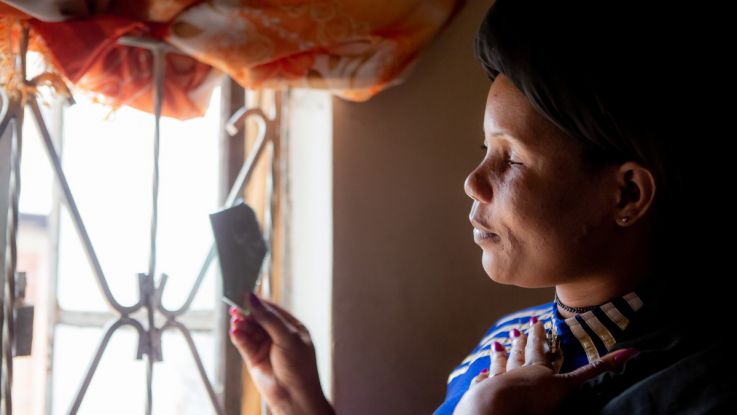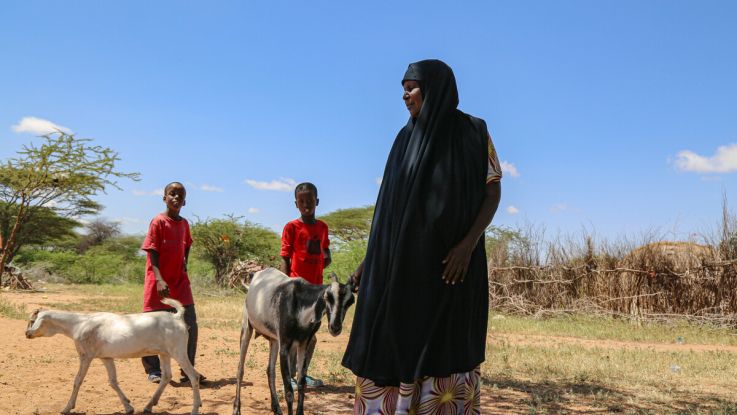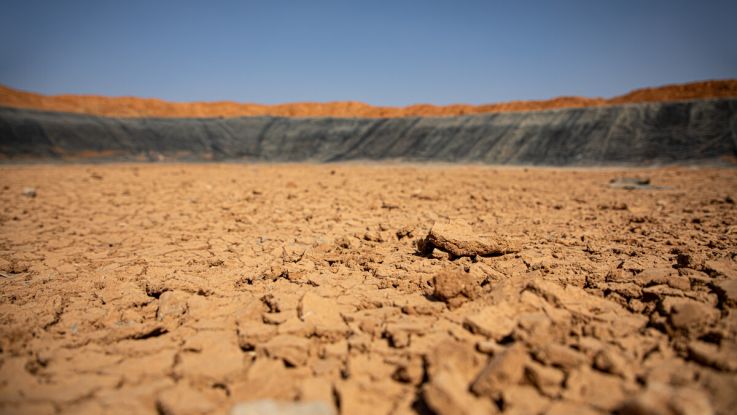Why Covid is a catastrophe in densely-packed places
15 May 2020
Imagine trying to stay six feet apart in a refugee camp or a slum. Find out how coronavirus crisis is a catastrophe in the most densely populated places around the world.
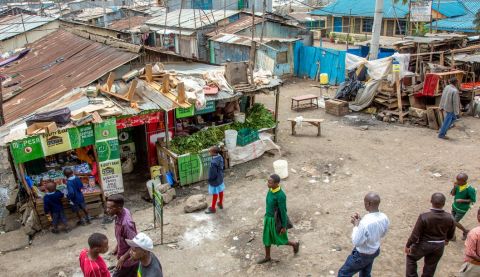
Covid-19 can be a catastrophe in densely-packed places around the world. Photo: ActionAid
Picture this. Cox’s Bazar in Bangladesh – home to the world’s largest refugee camp1 - about one million people living in shelters.
Picture a population of 11.25 million people - roughly the same size as that of Portugal — inhabiting Brazil’s favelas.2, 3.
And imagine 17% of the India’s urban population - that is around 65 million people - dwelling in informal, slum settlements.4
Now imagine trying to stay apart six feet from other people when out getting food or trying to make a living.
How can you wash your hands regularly and safely when you share a tap with a thousand people? How can you self-isolate in an overcrowded refugee camp? How can you practise six feet of social distancing in the narrow alleyways of your settlement? Or escape a violent partner when you are being ordered to stay at home?
Lives in these settings were already precarious.
Rohingya refugees of Cox’s Bazar live in temporary shelters, stuck between countries with nowhere to call home and reliant on small jobs for income and external aid.
In Mumbai’s slums you will find extended families of five to eight people cramped together in one or two room shacks without running water.
In Rio’s favelas, sanitation is a problem. Sewage flows freely between houses.
In Nairobi's biggest slum, 300,000 people are packed in an area smaller than the size of London's Hyde Park and Kensington Gardens.
In these conditions social distancing is a luxury that the world’s poorest cannot afford.
Unable to work during lockdown, having to self-isolate in crowded conditions and with aid and food supply chains being affected, people in densely-packed environments are suffering some of the most severe consequences of the Covid-19 pandemic.
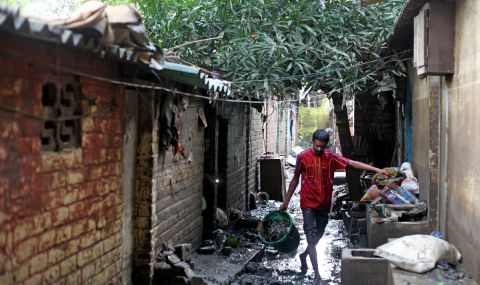
Slums in India are densely-packed and can have poor water, sanitation and hygiene infrastructures.
Poor hygiene and sanitation is common in large informal settlements
Brazil has seen its highest daily rise in the number of deaths in May 2020, making it the sixth worst-affected country in the world in terms of recorded Covid-19 related deaths.5
Experts think the real figure may be far higher due to a lack of testing in the country.
Here, the urban areas are a lot more susceptible to the spread of coronavirus than the rural areas, because of the population density, particularly in the favelas.
The conditions in the cities' favelas facilitate the spread of disease as the houses are interconnected, there is no proper sewage or water treatment, and there’s a lack of ventilation.
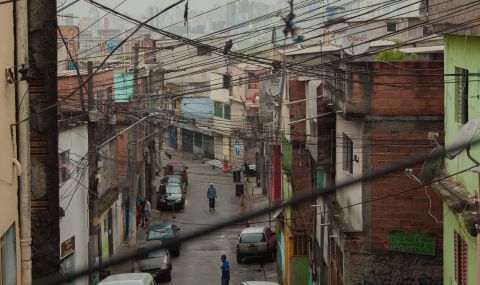
Heliópolis, which means Sun City is Brazil’s largest favela .
ActionAid Brazil's Communication and Campaign Manager, Glauce Arzua knows that Covid-19 will have devastating consequences for the densely-populated favelas in Brazil's major cities.
This pandemic is at a scale that we have never experienced in Brazil.
The hygiene conditions are very poor and there are many people living in the same house, which is often just a few square metres.”
Across the globe, in Bangladesh, the first coronavirus cases have now been detected where some of the world's poorest live - the Rohingya refugees in Cox's Bazar. There are fears that it will now spread quickly in the cramped conditions.
ActionAid Bangladesh's Country Director, Farah Kabir said the risks are now tremendous.
Typically there are five to seven people living in one 10x15 feet shelter made out of bamboo and tarpaulin so social distancing is incredibly difficult
The Rohingya refugees are particularly vulnerable because their nutrition and health has been very poor after fleeing persecution, and now they are living in a very congested space with limited access to clean water."
Furthermore, the pandemic has hit those countries the hardest where health infrastructure is already weak. In densely-populated countries there may be fewer hospital beds and equipment such as ventilators per capita. For example, India has only 0.55 beds per 1000 population.6
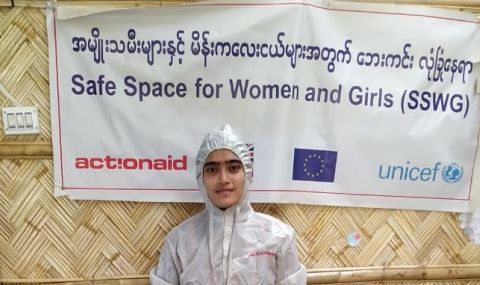
Sharmin runs the women's friendly spaces in Cox's Bazar, Bangladesh.
The coronavirus crisis has also affected access to medical and psychosocial support as staff availability is limited.
21-year-old Sharmin Akhtar works as an ActionAid Case Manager at Cox's Bazar.
Sharmin hopes for 24-hour emergency healthcare for the people in the camp. But in the meantime, for anyone wishing to access health services in Cox's Bazar, there might be quite a wait.
The refugees are not getting medical treatment. Even if they go to the clinics, they are not getting it.
The clinics have set a figure, that they will only see 10 patients a day. Before the lockdown they were seeing more than 30 a day.
Access to food for thousands is harder in densely-packed locales
Some of the world's poorest countries also are the world's most densely populated and often hard to reach.
In Kenya's slums, limited public space for roads and pathways means that it is difficult to get large quantities of food to people in time.
While in Brazil's favelas, that are inhabited by street vendors, labourers and others who relied on daily wages, many are now struggling without income and food as the country goes under lockdown.
As schools also shut, these low-income households that relied on school meals for children are now struggling with more people to feed on a daily basis.
Glauce Arzua, said the situation is becoming difficult.
These are the parents whose children would not eat at home in day-to-day normal life – these children would eat at school and then the family would reunite in the evening.
These families can only provide one meal a day. And now they have to deal with three meals a day for a number of people – and they don't have the money."
As the coronavirus crisis escalates around the world, Sharmin can see big problems starting to emerge in the camp.
Agencies and aid workers can enter the camp to provide food, but lockdowns and social distancing measures especially in crowded camps, means that the flow of food has slowed down.
The biggest problem I am experiencing is to do with food and medical aid.
The food system is such that unless there is a real emergency, they are not giving food... But the problem is that it cannot be distributed like it used to. Social distancing has to be maintained.
In the past people would line up for their food and the agency worker would check their ration cards and give them the food. Now… staff are working on a roster basis. So, this has reduced the amount of food that can be delivered in a day. So, when you line up for food it could take a very long time to get it."
Cramped living situations can give rise to domestic violence
As food is becomes scarce, it is giving rise to domestic violence, as the coronavirus lockdown conditions has heightened tensions in households around the world.
More and more, men and women are staying at home together as they cannot work under lockdown. Lack of income and food shortages are contributing to arguments, which are becoming aggressive quickly.
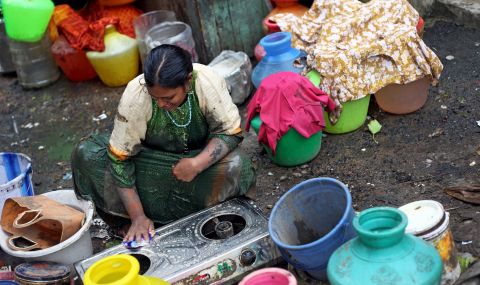
Slums in India are overcrowded with several members of one family living in crowded shacks.
Sharmin has seen a spike in gender-based violence and is concerned about the timing as counselling, medical and legal help are currently in short supply at Cox's Bazar.
There is always this ‘pressure cage’ that the women and girls are in.The problem is that many women and girls won’t be able to maintain social distancing because their homes are very small.
Because of the food shortage, the wife might be telling the husband that we need this or that food. So, then the husband, who doesn’t have an income, will feel frustrated.
This is one reason why violence has increased a lot. If the wife says one or two things that the husband doesn’t like, he can start to become very violent and lash out a lot.
Also, many people are stuck indoors, their minds are troubled, and they are starting to have disturbing thoughts. In this environment, small matters can turn into great big issues. So, people are not feeling mentally well."
Similarly, in Brazil's favelas, women have nowhere to go as they are living in quarantine with potentially volatile family members. Glauce Arzua understands the very serious consequence of the Covid-19 pandemic, that is the rise of domestic violence in the crowded favelas.
The abuse and the sexism that is already very present is now very much more intense. [The pandemic] has reinforced traditional gender roles and made men aggressive as they don’t have an income. Normally, they can be very aggressive and now there is the pressure of the lockdown too.”
Like in Cox's Bazar, services that support women have been affected due to lockdown.
We’ve been helping to create networks which provide emotional support, campaign against domestic violence and strengthen women’s ability to get to create their own [businesses].
None of this is now happening because of the lockdown. And these women will be left behind.
What is ActionAid doing to help alleviate this crisis?
In Brazil, we are working with our partner UNAS across several favelas to provide food packages to those struggling with job losses and stagnant income.
ActionAid has been investing in strengthening women's autonomy and creating women-only spaces so women can meet, and hare their problems and discuss solutions. Due to lockdown in Brazil some of these services have been affected and we are using social media apps such as WhatsApp to connect with women instead.
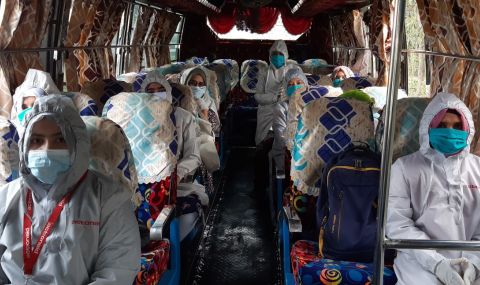
ActionAid Bangladesh staff members on their way to Cox's Bazaar to work with Rohingya refugees.
In Bangladesh, we have provided our camp staff like Sharmin with PPE gear, gloves and hand sanitiser so they can carry out their work safely. Sharmin now teaches her clients about social distancing and gives out masks, gloves and hand sanitiser – while maintaining 3 metres distance.
We are also still running our women-friendly spaces in Cox's Bazar - an essential service that links vulnerable women and girls to food and medical agencies and provides psychosocial counselling.
In India, we have set up community kitchens for migrant and informal workers and running food parcel donation schemes. We are hoping to reach more than 55,000 of the most vulnerable families.
In Kenya, we are distributing information and myth-busting leaflets to communities through our network of women’s collectives and community groups.
How you can help
ActionAid is on the frontline of the coronavirus crisis helping to stop the spread and save lives as the pandemic hits the world’s poorest countries.
From Italy to India, Liberia to Kenya, local ActionAid-supported women’s groups are distributing life-saving advice, health information and hygiene kits to vulnerable communities.
We are also distributing food packages and essential supplies, working to stop violence before it happens, and provide support to women and girls who are affected. Please donate now to help us reach people in urgent need.
Footnotes
- 1 Altman, M.J. "Rohingya Crisis: A Firsthand Look Into The World's Largest Refugee Camp". World Food Program USA.
- 2https://www.bbc.co.uk/news/world-latin-america-27635554
- 3https://www.worldometers.info/demographics/portugal-demographics/
- 4https://timesofindia.indiatimes.com/india/17-of-urban-India-lives-in-slums-Census/articleshow/19118219.cms
- 5https://www.bbc.co.uk/news/world-latin-america-52644339
- 6https://www.brookings.edu/blog/up-front/2020/03/24/is-indias-health-infrastructure-equipped-to-handle-an-epidemic/

